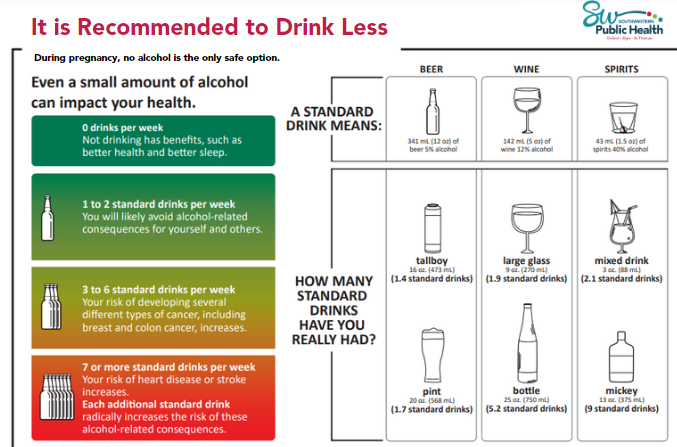How alcohol affects health
What are the guidelines?
Canada’s guidance on alcohol consumption is that drinking less is better. Research shows that no amount of alcohol is good for your health, and it doesn’t matter what kind of alcohol it is – wine, beer, cider or spirits. Even a small amount can be damaging. Therefore, if you drink, it’s better to drink less.
Learn the various health risks of drinking alcohol, based on Canada’s Guidance on Alcohol and Health (ccsa.ca).
Canada's Guidance on Alcohol and Health Brochure (Downloadable PDF)
Alcohol and cancer
Cancer is the leading cause of death in Canada. Alcohol is a carcinogen that can cause at least seven types of cancer. Data shows the use of alcohol causes nearly 7,000 cases of cancer deaths each year in Canada, with most cases being breast or colon cancer, followed by cancers of the rectum, mouth and throat, liver, esophagus and larynx.
Drinking as little as three standard drinks per week increases your risk of cancer.
Alcohol an heart disease
Heart disease is the second leading cause of death in Canada. Alcohol is not good for your heart. For many years, the commonly held belief that drinking in moderation offered protection against heart disease has been widely publicized. However, research in the last decade has shown that drinking a little alcohol neither decreases nor increases the risk of ischemic heart disease (also known as coronary artery disease, which is the leading cause of heart attacks). At higher levels of use, alcohol increases the risk of ischemic heart disease in addition to most other types of cardiovascular disease, including heart failure, high blood pressure, heart attacks, atrial fibrillation and flutter, and different types of strokes.
Drinking seven or more standard drinks per week increases your risk of heart disease and stroke.
Alcohol and liver disease
Alcohol is harmful to your liver. When the liver processes alcohol, some of the liver cells can get destroyed. While the liver can develop new cells, drinking too much alcohol over many years reduces the liver’s ability to regenerate. Alcohol can cause fatty liver disease, inflammation, permanent scarring (cirrhosis), and liver cancer.
Alcohol, violence and injury
Alcohol is frequently associated with violent and aggressive behaviour, including intimate partner violence, sexual violence, and aggression and violence between adults. Alcohol can increase the severity of violent incidents. Avoiding drinking to intoxication will reduce an individual’s risk of perpetrating alcohol-related violence. Increased levels of alcohol use also increases risk for road injuries, self-harm, falls and other unintentional injuries.
Alcohol use disorder
Regularly drinking alcohol can reduce how it affects you, so you could end up developing a tolerance and drinking more to get the feeling you like. With increased use, you can develop alcohol use disorder (how we now describe “addiction” or “dependence” on alcohol). Drinking regularly can lead to professional, personal, financial, and legal problems, all of which can affect your health. In addition, mixing alcohol with other substances can also lead to unpredictable and/or harmful effects to your health.
What other health risks are there?
Other health risks of drinking alcohol include pancreatitis, epilepsy, and impacts to the immune system that can put you at increased risk of certain infections. Drinking less benefits you and others. Drinking less will reduce your risk of serious health problems, injury and violence that can shorten and reduce quality of life.
Who should completely avoid alcohol?
- children and youth
- pregnant people
- people who are breast/chest feeding
- people who are managing mental health or substance use issues
- people who are taking any other substances or prescription drugs that can interfere with alcohol
- people who are driving or operating machinery
- people who want to completely avoid the risks associated with alcohol
Learn more about the research around alcohol-related harms and cancers:
Want to learn more about alcohol and health? Visit our main alcohol page at www.swpublichealth.ca/alcohol.











